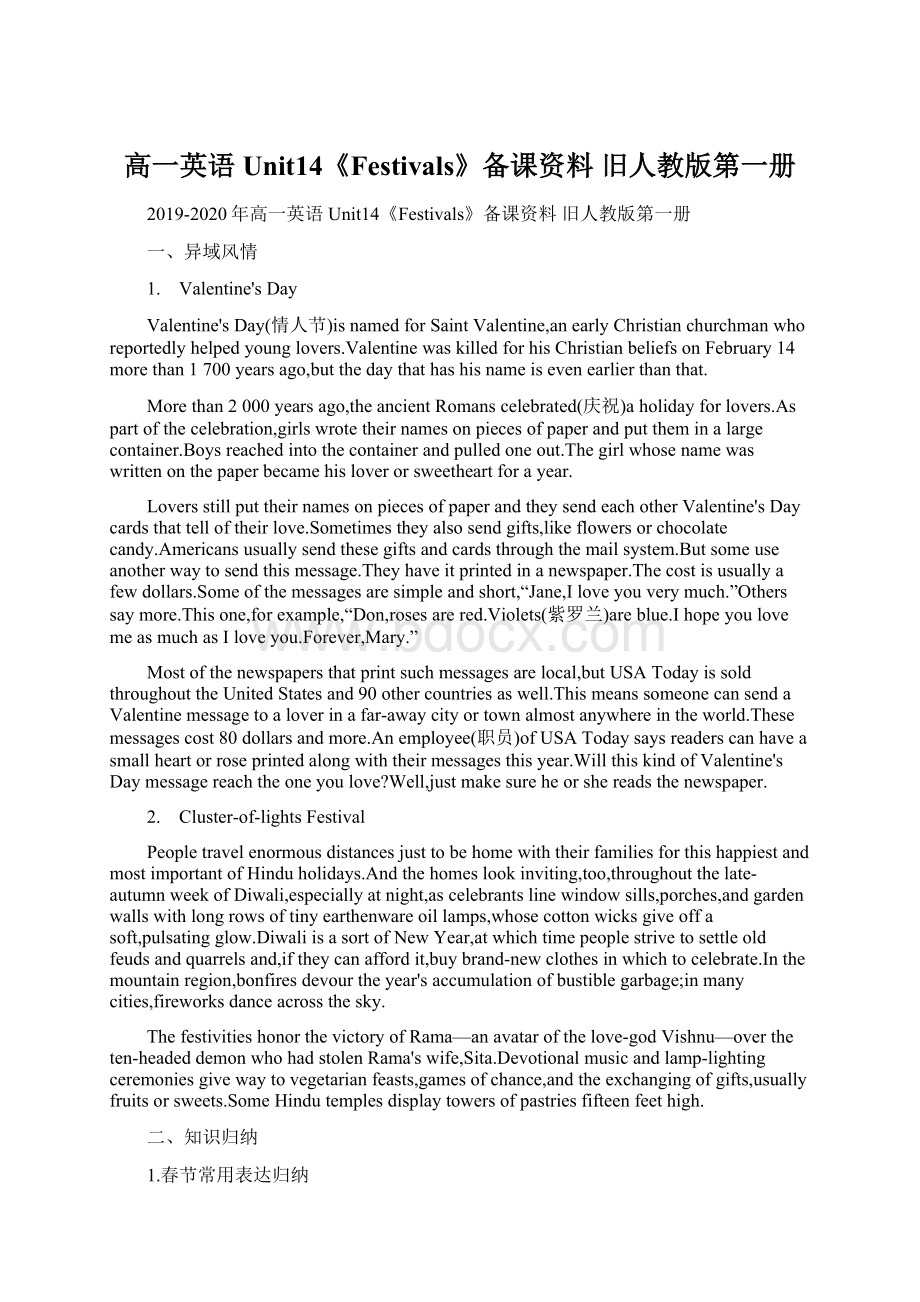高一英语 Unit14《Festivals》备课资料 旧人教版第一册.docx
《高一英语 Unit14《Festivals》备课资料 旧人教版第一册.docx》由会员分享,可在线阅读,更多相关《高一英语 Unit14《Festivals》备课资料 旧人教版第一册.docx(15页珍藏版)》请在冰豆网上搜索。

高一英语Unit14《Festivals》备课资料旧人教版第一册
2019-2020年高一英语Unit14《Festivals》备课资料旧人教版第一册
一、异域风情
1. Valentine'sDay
Valentine'sDay(情人节)isnamedforSaintValentine,anearlyChristianchurchmanwhoreportedlyhelpedyounglovers.ValentinewaskilledforhisChristianbeliefsonFebruary14morethan1700yearsago,butthedaythathashisnameisevenearlierthanthat.
Morethan2000yearsago,theancientRomanscelebrated(庆祝)aholidayforlovers.Aspartofthecelebration,girlswrotetheirnamesonpiecesofpaperandputtheminalargecontainer.Boysreachedintothecontainerandpulledoneout.Thegirlwhosenamewaswrittenonthepaperbecamehisloverorsweetheartforayear.
LoversstillputtheirnamesonpiecesofpaperandtheysendeachotherValentine'sDaycardsthattelloftheirlove.Sometimestheyalsosendgifts,likeflowersorchocolatecandy.Americansusuallysendthesegiftsandcardsthroughthemailsystem.Butsomeuseanotherwaytosendthismessage.Theyhaveitprintedinanewspaper.Thecostisusuallyafewdollars.Someofthemessagesaresimpleandshort,“Jane,Iloveyouverymuch.”Otherssaymore.Thisone,forexample,“Don,rosesarered.Violets(紫罗兰)areblue.IhopeyoulovemeasmuchasIloveyou.Forever,Mary.”
Mostofthenewspapersthatprintsuchmessagesarelocal,butUSATodayissoldthroughouttheUnitedStatesand90othercountriesaswell.ThismeanssomeonecansendaValentinemessagetoaloverinafar-awaycityortownalmostanywhereintheworld.Thesemessagescost80dollarsandmore.Anemployee(职员)ofUSATodaysaysreaderscanhaveasmallheartorroseprintedalongwiththeirmessagesthisyear.WillthiskindofValentine'sDaymessagereachtheoneyoulove?
Well,justmakesureheorshereadsthenewspaper.
2. Cluster-of-lightsFestival
PeopletravelenormousdistancesjusttobehomewiththeirfamiliesforthishappiestandmostimportantofHinduholidays.Andthehomeslookinviting,too,throughoutthelate-autumnweekofDiwali,especiallyatnight,ascelebrantslinewindowsills,porches,andgardenwallswithlongrowsoftinyearthenwareoillamps,whosecottonwicksgiveoffasoft,pulsatingglow.DiwaliisasortofNewYear,atwhichtimepeoplestrivetosettleoldfeudsandquarrelsand,iftheycanaffordit,buybrand-newclothesinwhichtocelebrate.Inthemountainregion,bonfiresdevourtheyear'saccumulationofbustiblegarbage;inmanycities,fireworksdanceacrossthesky.
ThefestivitieshonorthevictoryofRama—anavatarofthelove-godVishnu—overtheten-headeddemonwhohadstolenRama'swife,Sita.Devotionalmusicandlamp-lightingceremoniesgivewaytovegetarianfeasts,gamesofchance,andtheexchangingofgifts,usuallyfruitsorsweets.SomeHindutemplesdisplaytowersofpastriesfifteenfeethigh.
二、知识归纳
1.春节常用表达归纳
春节 theSpringFestival
正月 thefirstmonthofthelunaryear
除夕 NewYear'sEve
正月初一 thelunarNewYear'sDay
元宵节 theLanternFestival
过年 celebratetheSpringFestival
春联 SpringFestivalcouplets
剪纸 paper-cuts
年画 NewYearpaintings
买年货 doSpringFestivalshopping
敬酒 proposeatoast
灯笼 lantern
烟花 fireworks
爆竹 firecrackers
灯谜 riddleswrittenonlanterns
灯会 exhibitoflanterns
守岁 staying-up
拜年 payNewYearcall;giveNewYear'sgreetings;NewYear'svisit
压岁钱 giftmoney
辞旧岁 bidfarewelltotheoldyear
扫房 springcleaning;generalhouse-cleaning
年糕 Nian-gao;ricecake;NewYear'scake
团圆饭 familyreuniondinner
年夜饭 thedinneronNewYear'sEve
饺子 Jiao-zi;dumpling
汤圆 Tang-yuan;dumplingsmadeofsweetrice,rolledintoballsandstuffedwitheithersweetorspicyfillings
金玉满堂 Treasuresfillthehome.
生意兴隆 Businessflourishes.
岁岁平安 Peaceallyearround.
恭喜发财 Wishyouprosperity.
和气生财 Harmoneybringswealth.
心想事成 Mayallyourwishesetrue.
吉祥如意 Everythinggoeswell.
招财进宝 Moneyandtreasureswillbeplentiful.
祝你一帆风顺!
Wishyoueverysuccess!
事业成功,家庭美满!
Wishyousuccessinyourcareerandhappinessofyourfamily!
祝你在新的一年里快乐幸福!
Wishyouhappinessandprosperityintheingyear!
祝你幸福一年胜似一年!
Mayeachyearbringyougreaterhappiness!
祝你新年快乐,万事如意!
WishyouahappyNewYearandthebestofeverything!
祝你新年大吉!
WishyougoodluckintheNewYear!
祝你在新的一年里百尺竿头,更进一步!
WishyoufurtherprogressintheNewYear!
愿数不尽的幸福和成功与岁同增!
Mayeachyearbringyougreaterhappinessandgreatersuccess!
2.表示“目的”的方法归纳
(1)用“介词或介词短语”来表示目的:
A.用介词for表“目的”,因for有“为了”之意。
e.g.goforawalk去散步
runforone'slife逃命
readforpleasure读书以求乐趣
—Whydoyoue?
你来干什么?
—Foradictionary.找本字典。
B.用“what…for”句型,表示“为什么,为何目的”?
e.g.WhatdoyoustudyEnglishfor?
你为什么学习英语?
Whatdidn'tyouefor?
你不来的目的是什么?
C.用with/forthepurposeof,forthesakeof,inthehopeof等短语表示目的,因为这些短语本身就是“为了”之意。
e.g.Today'sadvertisementsoftenstartwithaquestion,orapuzzle,withthepurposeofattractingthereader'sattraction.
今天的广告常常以一个问句或一个谜语开头,目的是引起读者的注意。
Hethereforeloadedtheshipwithlitersofwinegarforthepurposeofcleaningtheinsideoftheship.
因此,他在船上装了好几升的醋,用来清洗船舱内部。
(2)用“不定式或不定式短语”来表示目的:
to/inorderto/soastodosth.均可表目的,但inorderto和soasto比to语气更强烈,目的更明确。
inorderto可以放在句首,而soasto一般不放于句首,若否定目的状语时,可在to前加not。
e.g.Wegotupearlytocatchthebus.
为了赶车,我们起得很早。
Soapybrokethewindowinorderto/soasto/torunaway.
为了逃跑,苏比打破了窗子。
Inordertofetchwood,peoplehadtowalkmanykilometres.
要打柴,村民们得走好多公里的路程。
(3)用“从句”来表示目的。
sothat和inorderthat可以引导目的状语从句。
从句中常用can,could,may,might等情态动词,两者常可互换,但inorderthat可放于句首,sothat不行。
但sothat后面不跟情态动词时,可引导结果状语从句。
e.g.Speakclearlysothat/inorderthattheymay/canunderstandyou.
讲清楚些,好让他们听懂。
ShelearnsEnglishsothatshemaygetmoreknowledge.
她学英语是为了获得更多的知识。
Everybodylentahand,sothattheworkwasfinishedontime.
人人动手,结果按时完成了任务。
注:
inorderto/soasto作目的状语常可和inorderthat/sothat引导的目的状语从句互换,但主语必须一致,如主语不一致,不定式就要用for引出其逻辑主语。
e.g.Hehastoworkhardsothat/inorderthathe'llbeabletoexam.=Hehastoworkhardto/inorderto/soastopasstheexam.
她努力学习,以便能通过考试。
I'llwatertheplantssothattheywillgrow.=I'llwatertheplantsforthemtogrow.
我浇灌植物,以便他们生长。
3.dress用法归纳
(1)vt.A.给……穿衣服。
表示自己穿衣服这个动作时,接反身代词作宾语或者用作不及物动词;表示替别人穿衣服时,接表示人的名词或代词作宾语。
构成dresssb./oneself结构。
e.g.Afterthebath,hedressedhimself.
洗完澡后,他穿上衣服。
Shehurriedlydressedhersonandtookhimtothekindergarten.
她匆匆忙忙地给她儿子穿好衣服,然后带他到幼儿园。
B.用过去分词作表语,表示穿着状况。
e.g.Heiswelldressed.
他穿得很好。
Themanispoorlydressed.
那人衣衫褴褛。
C.be/getdressedin表示穿着……的衣服,后面接表示衣服或者颜色的词。
e.g.Shewasdressedinwhite.
她穿着白衣服。
ThetwoforeignstudentswerebothdressedinChinesestyleclothes.
那两个外国学生都穿着中式衣服。
(2)vi.A.穿衣;穿(夜)礼服,后面常接副词或表示目的、场合的介词短语。
e.g.Getupanddressquickly.
快起床穿衣。
I'llbereadyinamoment;I'mdressing.
我一会儿就准备好;我正在穿衣服。
Fewpeopledressfordinnernow.
现在很少有人穿礼服赴宴了。
Theyalldressedwell(badly).
他们穿得都不错(不好)。
B.dressup穿上盛装,乔装打扮(指欧美人在化装舞会或演戏时穿的特殊服装)。
e.g.Don'tbothertodressup—easyouare.
用不着穿讲究衣服——就穿平常的衣服来吧。
(3)n.女服;礼服;服装
dress作“女服”“礼服”解时是可数名词,作“服装”讲时,是不可数名词。
e.g.Atthepalaceball,allthewomenworetheirsmartestdresses.
在宫廷舞会上,所有的妇女都穿着最漂亮的衣(礼)服。
Inthisoldplay,theactorswearthedressof100yearsago.
在这出旧戏中,演员们都穿着一百年前人们穿的服装。
Hedoesn'tcaremuchaboutdress.
他不太注意衣着。
三、词语辨析
1.allow,permit,let,promise
(1)allow和permit都表示“允许某人做某事”,后面跟名词、动名词作宾语,跟不定式作宾补。
但allow多表示“听任,不阻止或默许”,即主语对别人所做的事情置之不管,表示一种“消极”的概念。
而permit多表示一种“积极”的概念,含有“给予某人某种权利”的意思,多用于正式场合。
(2)let表示“让”,多用于口语,“允许”的意味较淡,后跟不定式作宾补时省略to。
e.g.Pleaseletthemsetoffatonce.
叫他们立刻出发吧。
Wholetthemanentertheroom?
谁让那人进来的?
(3)promise“答应某人做某事”。
e.g.Ipromiseyoutoleave.
我答应你(我)走。
比较Iallowyoutoleave.
我允许你走。
2.nation,country,state
nation,country,state三词都有“国家”的意思,但侧重点不同。
nation着重指人民。
因此可译作“民族”“国民(总称)”。
e.g.Thisisgoodnewsforthetobaccopany,butbadnewsforthehealthofthenation.
这对烟草公司来说是好消息,而对全民的健康来说则是坏消息。
Thewholenationwasindeepsorrowatthisnews.
当全国人民听到这个噩耗时,都沉浸在深切的悲痛之中。
theChinesenation中华民族
country着重指疆土、国土、家园,也可指一个人的祖国或国籍所在国。
e.g.Chinaisasocialistcountry.
中国是一个社会主义国家。
Aftermanyyearsabroadhewantedtoreturntohiscountry.
他在国外呆了许多年后,想要返回祖国。
Thesoldiersfoughtbravelyfortheircountry.
战士们为祖国英勇作战。
另外,country还可指乡村,侧重点仍然是土地。
e.g.Wearehopingtoliveinthecountry.
我们都想到农村去生活。
state着重指政体、政权、政府和国家机器。
e.g.aheadofstate国家元首
HighwaysinChinabelongtothestate.
中国的高速公路属于国家。
Scotlandisanationbutnotastate.
苏格兰是一个民族而不是一个国家。
另外,state还可指组成国家的州,特别是在美国。
e.g.HowmanystatesarethereintheUnitedStatesofAmerica?
美国有多少个州?
3.ina/oneword,inotherwords,inwords
(1)ina/oneword意思是“简言之,总之”。
一般作插入语,通常位于句首,用逗号与句子隔开。
e.g.Inaword,wemustlearnEnglishwell.
总之,我们必须学好英语。
Inaword,sheisagoodteacher.
总之,她是一位好老师。
(2)inotherwords意思是“换句话说”“换言之”,常位于句首,对前面所说的话进行解释。
e.g.Idon'twanttogonow.Inotherwords,Iprefertowaitawhile.
我现在不想去,换句话说,我想等一会儿。
Youfailedtheexamthistime.Inotherwords,youdidn'tpasstheexamthistime.
你这次没有通过考试。
换句话说,你这次考试没及格。
(3)inwords意思是“用语言,口头上”也可以写为withwords,通常位于句末。
e.g.Idonotwantyousimplytopromisemewith/inwordsthatyouwillbegood.
我并不要求你们只在口头上答应我你们要做好学生。
Ican'tdescribeitin/withwords.
我无法用语言来描述。
4.honour,admire,respect
(1)honour指对某人或某物表示极大的敬意。
e.g.Childrenshouldhonourtheirparents.
孩子们应当尊敬父母亲。
Wearegatheredheretohonourthememoryofthisgreatman.
我们聚集在这里缅怀这位伟大人物。
(2)admire指对某人、某物的仰慕或赞扬,有很深的情感。
e.g.Iadmireyourhard-workingspiritverymuch.
我非常钦佩你的刻苦精神。
Headmiredmeformycourage.
他佩服我的勇气。
(3)respect尤指对年长或地位高的人表示的尊敬。
e.g.Weshouldrespectourelders.
我们应当尊敬长者。
Carlisanofficervastlyrespectedbythesoldiers.
卡尔是一位深受士兵敬爱的军官。
四、能力训练
(一)单句改错(make+复合宾语)
1.Hewillmakemetotryagain.
答案:
把to去掉。
当不定式作make的宾语时,一般不能带“to”。
2.Imakethedistancebeabout40miles.
答案:
把be去掉或者在be前加to。
当make作“估计,认为”讲时,宾补中的tobe一般省去,有时也不省。
但不可只省去“to”。
如:
Whatbirddoyoumakethattobe?
3.Hehasbeenmaderecitethetext.
答案:
在recite之前加to。
make用于被动语态,其